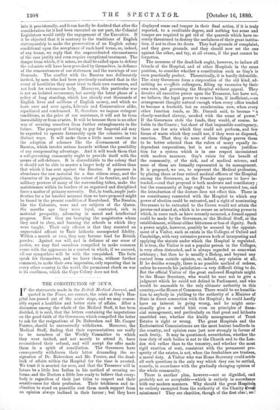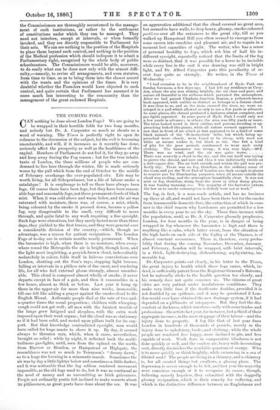THE CONSTITUTION OF GUY'S.
IF the statements made in the British Medical Journal, and quoted in the Times, are correct, the crisis at Guy's Hos- pital has passed out of the acute stage, and we may reason- ably expect a healthier and better state of affairs. After a discussion among the whole of the Medical Staff, it has been decided, it is said, that the letters containing the imputations on the good-faith of the Governors, which compelled the latter to ask for the resignations of Dr. Habershon and Mr. Cooper Forster, should be unreservedly withdrawn. Moreover, the Medical Staff, finding that their representatives are really to be members of the Weekly Committee to which they were invited, and not merely to attend it, have reconsidered their refusal, and will accept the offer made them in a spirit of conciliation. The Governors have consequently withdrawn their letter demanding the re- signation of Dr. Habershon and Mr. Forster, and the dead- lock of affairs within the Hospital for the time is averted. We trust it is averted for ever, and that the Treasurer will in future be a little less Indian in his method of securing re- forms, and the Doctors a little less ready to believe that every- body is regardless of their just titles to respect and their sensitiveness for their profession. Their tetchiness and in- clination to stand on punctilio cost them much support from an opinion always inclined in their favour ; but they have
displayed sense and temper in their final action, if it is truly reported, to a creditable degree, and nothing but sense and temper are required to get rid of the quarrels which have re- cently threatened to destroy the usefulness of their great institu- tion, if not to close its doors. They had grounds of complaint, and they gave grounds, and they should now set the one against the other, and try, at all events, if the past cannot be forgotten.
The nearness of the dead-lock ought, however, to induce all friends of the Hospital, and of other Hospitals in the same position, to consider whether a constitution such as Guy's is even practically perfect. Theoretically, it is hardly defensible. The sixty Governors form a corporation of the old kind, ad- mitting no ex-officio colleagues, filling up vacancies by their own vote, and governing the Hospital without appeal. They devolve all executive power upon the Treasurer, but have not, we believe, the legal power to remove him, if inefficient,—an arrangement thought natural enough when every office tended to become a freehold, but an anachronism now, when every other function tends, as Mr. Disraeli said, to become " a closely-watched slavery, mocked with the name of power." If the Governors stole the funds, they would, of course, be liable to the Courts ; but short of that impossible contingency, there are few acts which they could not perform, and few forms of waste which they could not, if they were so disposed, sanction. That they do none of these things proves them to be better selected than the rulers of many equally in- dependent corporations, but is not a complete justifica- tion for a system which is in one respect inconsistent with modern manners. Guy's exists for the benefit of the community, of the sick, and of medical science, and none of them are formally represented in its management. It is proposed, we see, to represent the Medical profession, by placing three or four retired medical officers of the Hospital among the Governors, as the Founder appears to have in- tended,—and that proposal is both moderate and conciliatory ; but the community at large ought to be represented too, and the introduction of the doctors does not effect this. There is no constituency connected with the Hospital to which any power of election could be entrusted, and a right of nominating Governors to be entrusted to the Crown would not attain the precise end aimed at, which is to secure an arbitrating power to which, in cases such as have recently occurred, a formal appeal could be made by the Governors, or the Medical Staff, or the establishment, without either bitterness or loss of dignity. Such a power might, however, possibly be secured by the appoint- ment of a Visitor, such as exists in the Colleges of Oxford and Cambridge, with very extensive powers both of interpreting and applying the statute under which the Hospital is regulated. It is true, the Visitor is not a popular person in the Colleges, is very often distrusted, and is always regarded as somewhat arbitrary ; but then he is usually a Bishop, and beyond any control from outside opinion, or, indeed, any opinion at all. If he decides wrongly, there is no possible method of redress, unless he exceeds his jurisdiction—a very difficult thing to do. But the official Visitor of the great endowed Hospitals might be the Home Secretary, who would be sure not to give a judgment which he could not defend in Parliament, and who would be amenable to the only ultimate authority in this country,—the House of Commons. There would be no humilia- tion to anybody in yielding to the authority of a Minister of State in direct connection with the Hospital ; he could hardly have an interest in going wrong, and he might occa- sionally give a useful hint even on principles of finan- cial management, and particularly on that great and hitherto unsettled one, whether the kindly management of Trust Estates is right or wrong. The great Hospitals and the Ecclesiastical Commissioners are the most lenient landlords in the country, and opinion runs just now strongly in favour of such lenity. It may be questioned, nevertheless, whether the true duty of such bodies is not to the Church and to the Lon- don sick rather than to the tenantry, and whether the most rigid exaction of rent, consistent with the permanent pro- sperity of the estates, is not, when the freeholders are trustees, a moral duty. A Visitor who was Home Secretary could settle all such questions in the only way which they can be settled, namely, in accordance with the gradually changing opinion of the whole community. There is another plan, however—not so dignified, and probably not so acceptable—which is entirely in accordance with our modern manners. Why should the great Hospitals be entirely exempted from the authority of the Charity (long!. missioners I They are charities, though of the first else, air:.
the Commissioners are thoroughly accustomed to the manage- ment of such institutions, or rather to the settlement of constitutions under which they can be managed. They need not interfere, except at intervals, or when formally invoked, and they are directly responsible to Parliament for their acts. We can see nothing in the position of the Hospitals to place them beyond such control, and nothing in the position of the Medical profession which should indispose it to admit a Parliamentary right, recognised by the whole body of public schoolmasters. The Commissioners would be able, moreover, to do easily what can be done now only with the utmost diffi- culty,—namely, to revise all arrangements, and even statutes, from time to time, so as to bring them into the closest accord with the wants and the opinions of the times. It is very doubtful whether the Founders would have objected to such control, and quite certain that Parliament has assumed it in cases much less interesting to the community than the management of the great endowed Hospitals.



































 Previous page
Previous page